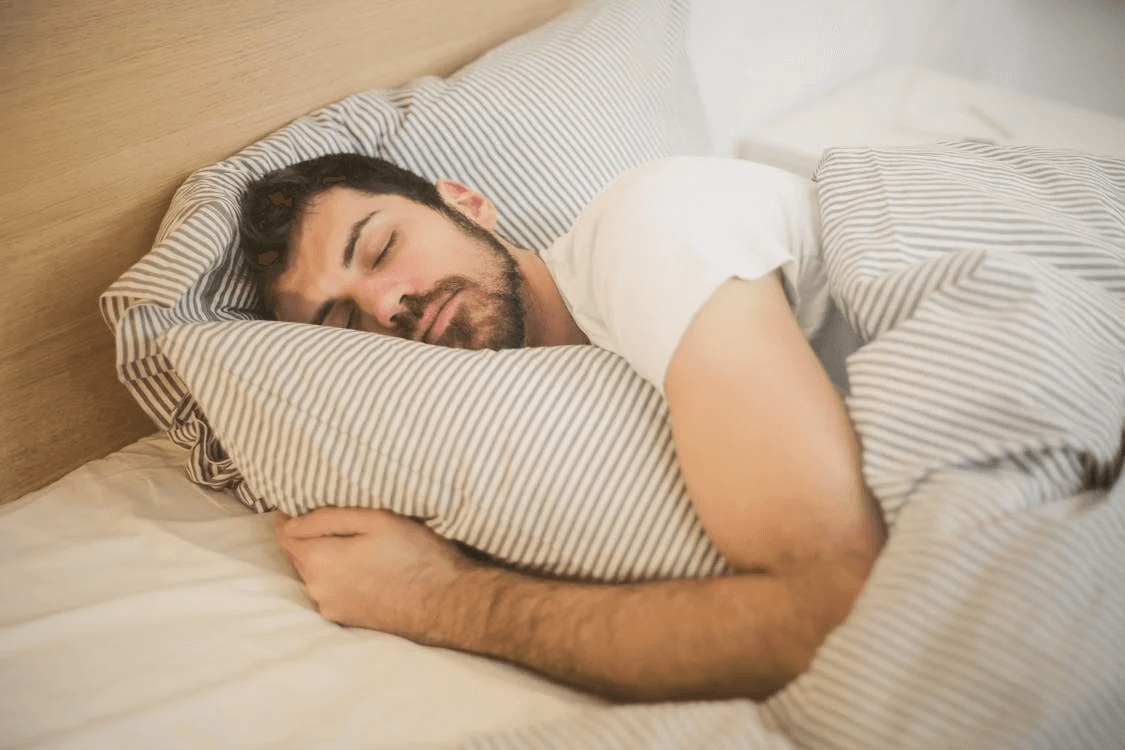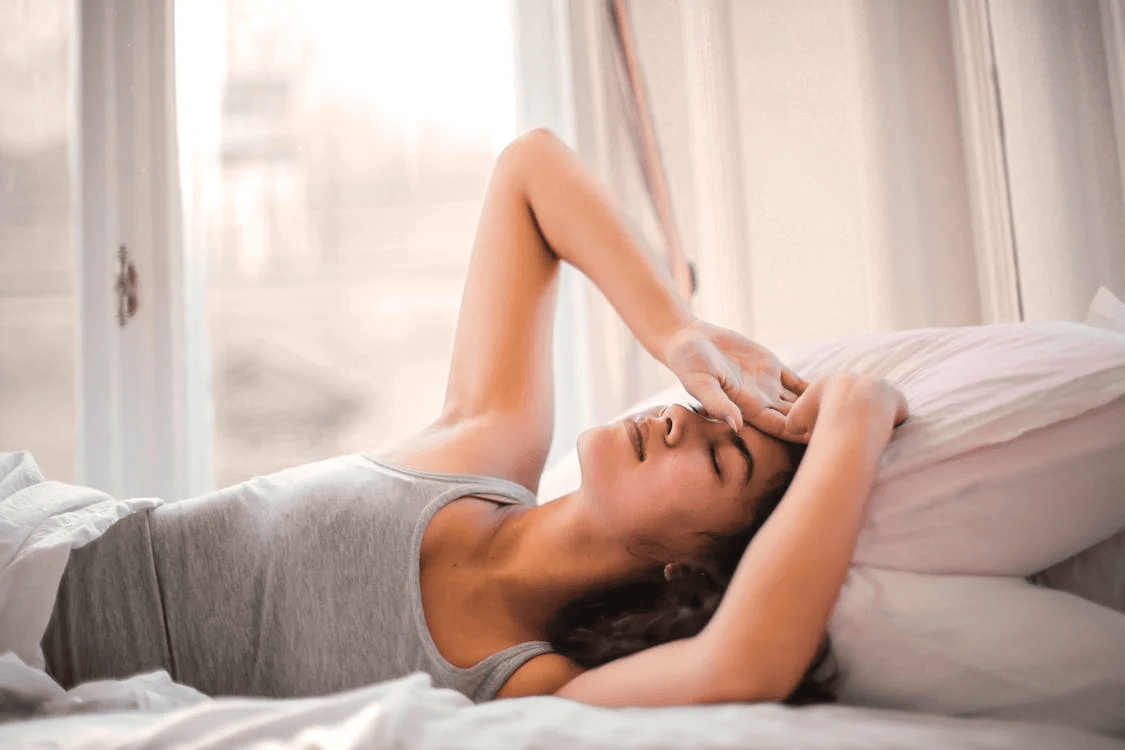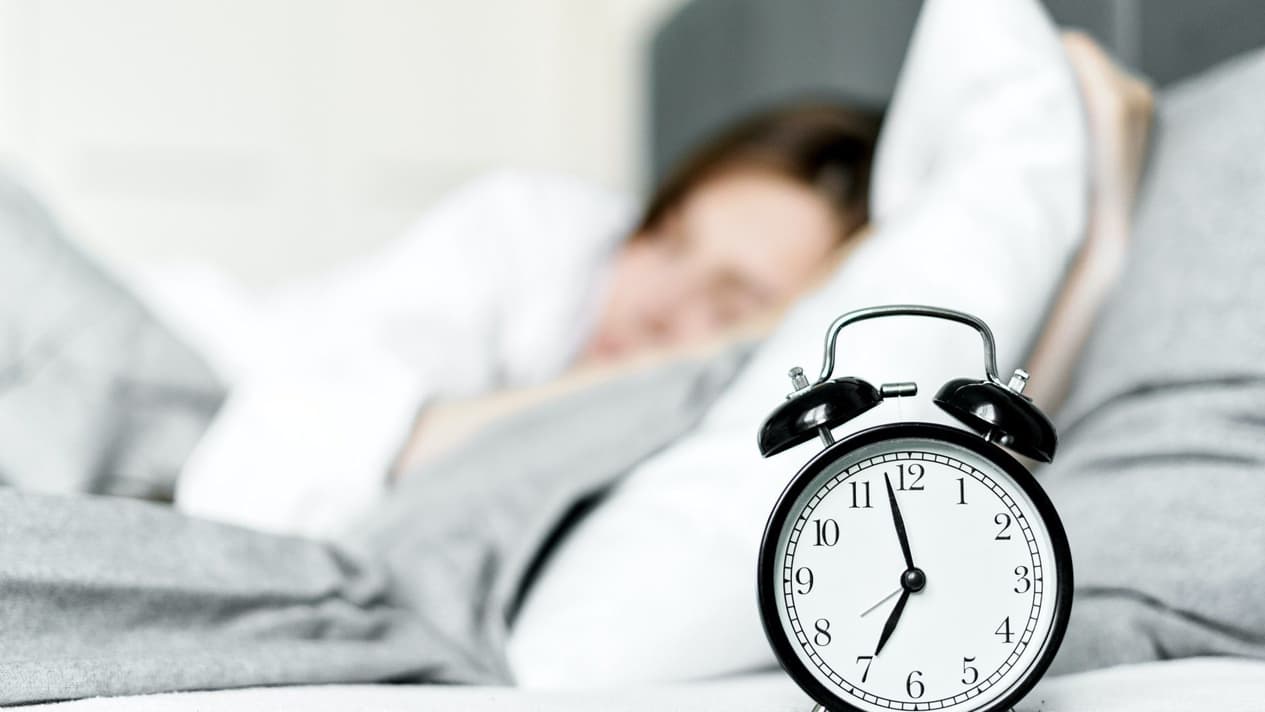How do you know if you’re sleeping enough? How does your body tell you if you're sleep-deficient?
Today, most of us face very busy and often stressful lifestyles. We've become a 24/7 society, where we are often on the go all day, working long hours, balancing parenthood with work commitments, eating unhealthy fast food, exercising less, and spending more and more time online. Consequently, modern life can cause higher levels of stress and anxiety across all ages than ever before, and this can lead to disrupted or poor quality sleep.
Getting an adequate amount of good quality sleep is vital to our overall well-being and health. While we sleep, our body and brain not only rest but also undertake important functions which contribute to our overall wellbeing.
But what exactly is 'good quality' sleep?

The Stages of Sleep
Within a normal sleep period, your body undertakes four to six sleep cycles every night, and each of these cycles consists of three non-rapid eye movement stages and one rapid eye movement stage. If we expand these stages further, we can break them down into two categories, REM (rapid eye movement) sleep and non-REM sleep ( 1 ).
1. Non-REM Sleep
There are three stages of non-REM sleep:
- The first stage is the "dozing off" stage, when we first start falling asleep. The body has not yet fully relaxed, though the body and brain activities start to slow with periods of brief twitches. Our eyes are closed but we can wake up easily- this could last for about ten minutes.
- The second stage is when we enter a light sleep. During this stage, the body temperature decreases, muscles are more relaxed, and breathing, brain activity and heart rate start to slow as the body is preparing itself for deep sleep. This phase could last between 10-20 minutes or slighter longer. A person typically spends half their sleep time in and out of this stage.
- The third stage is known as the deep sleep stage. It isn't easy to be woken during deep sleep, but if you were to be abruptly woken at this stage, you would need a bit of time to adjust, as you would feel somewhat disorientated for a few minutes following.
The deep sleep stages of non-REM sleep are very important, as this stage allows our body time to regrow and repair tissues, strengthen our immune system, and build up our bones and muscles- so in a sense, it's a full-body workout happening while we rest. How's that for inactive recovery? There is evidence that deep sleep also contributes to insightful thinking, creativity, and memory ( 2, 3).
2. REM Sleep
REM stands for Rapid Eye Movement and is a type of sleep that happens at night during intervals and, as the name suggests, our eyes undertake rapid movements during this cycle. During REM sleep, brain activity picks up, nearing levels seen when you're awake. At the same time, the body experiences atonia, which is a temporary paralysis of the muscles, with two exceptions: the eyes and the muscles that control breathing.
During the REM stages of our sleep, we dream more, and these dreams tend to be more vivid. Dreams can occur in any sleep stage, but they are less common and intense in the non-REM periods. There is also an increase in our pulse and breathing, and more bodily movements occur. REM sleep is a time when our brain activity increases, and it is an important element because it stimulates areas of our brain associated with learning, creativity, and memory. This stage also has an association with our body, increasing its production of proteins ( 4, 5). This type of sleep normally happens within about 90 minutes of you falling asleep. An interesting comparison is that adults spend around 20 % of their sleep within the REM stage, whereas for babies, this is about 50%.
Getting an adequate amount of good quality sleep is vital to our overall health and wellbeing, and in supporting important functions in the body.
How much sleep should I get?
Recommendations suggest that healthy adults should be getting around seven to nine hours of sleep per night, but some may need more and some less ( 6 ). What's important is that we find out how much sleep we need and aim for that. Young children, teens and babies require even more because of the significant growth and development that is occurring during these life stages ( 7).
Older adults aged 65 and over should aim to get around 7-8 hours per night ( 8 ).
As a general rule, if you wake up tired and are tempted by a nap during the day, you're probably not getting enough sleep.

Signs of sleep deprivation
- Feeling clumsy and sleepy
- Waking up feeling not refreshed and unmotivated
- Craving pick-me-ups like tea, coffee, chocolate, or junk food
- Struggling to concentrate and having a poor memory
- Feeling moody or depressed
- Puffy, red eyes with dark circles beneath them
- Slowed thinking
- Reduced attention span
- Poor or risky decision-making
- Lack of energy
In severe cases of bad sleep hygiene, lack of sleep can affect your overall health and make you prone to serious medical conditions, such as obesity, heart disease, high blood pressure, and diabetes.
The dangers of poor sleep hygiene
Having the occasional night of bad sleep in itself is not uncommon and not cause for alarm; however, the concern develops when this becomes an increasingly common issue for you and the days of poor sleep become common and all too normalised- this is often referred to as 'sleep debt'. Sleep debt is a continuous build-up of poor sleep, which eventually leads to your body responding with a 'pay now notice', in the form of physical signs and illness! ( 9)
The longer-term dangers of inadequate sleep are quite widespread and concerning. This feeling of sluggishness and concentration problems can be a dangerous situation in the workplace, especially for those who rely on high levels of awareness and concentration such as those in the transport industry needing to drive or fly for long periods; those needing to make life and death and decisions in the medical fields; and those who need to be extra vigilant in their care of others who are vulnerable such as parents of babies and young children.
As we can see, disturbed or poor quality sleep can lead to issues not only in the short term but run the risk of contributing to long term health problems- many of them dangerous to our quality of life and life expectancy - such as cardiovascular disease ( 10), diabetes (11), obesity ( 12), immunodeficiency ( 13), hormonal abnormalities ( 14), high risk of developing pain or worsened pain, and mental health disorders ( 15).
There are many reasons why we find ourselves not getting enough sleep, and it's often more complex than just a lumpy mattress or an overly firm pillow.

Reasons for disturbed sleep
There are so many different factors which can prevent us from getting a good night's sleep, and you may experience more than one at a time! It's good to give some thought to what is affecting your sleep, however, as awareness of the problems can help you to find a solution:
- Stress - we've all had a sleepless night before an exam or job interview, but ongoing anxiety and stress are major causes of sleeplessness. The first thing is to recognise this, then take steps to address the root cause.
- Environment - many people find their sleep is disturbed by a partner snoring, traffic noise, noisy neighbours, children or pets jumping on the bed! Your bed may be uncomfortable, or your bedroom stuffy, or too light, all of which can affect your sleep quality.
- Eating habits - a poor meal schedule can cause a poor sleep schedule. Eating just before bed - especially hard-to-digest fatty foods - means your digestive system is working hard when your body should be resting. If you skip meals, your hunger might wake you. Rushing your food might cause painful indigestion during the night.
- Diet - eating the wrong foods before bed can cause disturbed sleep. For example, spicy foods can cause acid reflux during the night; and sugary foods can give you a sugar rush, perking you up when you should be winding down. Eating enough protein might help you to sleep - read more about protein and sleep in our article.
- Sedentary lifestyle - if you're not using up enough energy during the day, you might find that you're not sleepy when it comes to bedtime.
- Blood sugar - if you eat a lot of sugary foods, your blood sugar levels may be irregular. The body may also wake you if you experience a blood sugar dip during the night.
- Irregular lifestyle - if you consistently go to bed and get up at a different time of day, you may find this disturbs your sleep quality.
- Alcohol - alcohol is a depressant, and while it might initially make you feel sleepy, it acts as a stimulant and has been associated with generalised sleep disturbance and poor sleep quality. The sugar in many alcoholic drinks and mixers can also cause blood sugar spikes.
- Caffeine - Coffee, tea, some fizzy drinks, and chocolate all contain caffeine, which disrupts sleep by blocking adenosine receptors. Adenosine is a sleep-promoting neurotransmitter produced in the brain during the day, which helps drive our need to sleep at night.
- Salty foods - A high intake of sodium from salty foods has been associated with poor sleep quality as it can cause water retention, which encourages nocturnal urination. Sodium (in salt) also depletes our magnesium stores - magnesium helps your brain and muscles relax, plus it helps to keep levels of sleep hormones like melatonin balanced.
- Medical conditions - various medical conditions, including thyroid problems, bladder issues, back pain, sleep apnea, and restless leg syndrome, can disturb sleep. Speak to your doctor for advice.
- Medication - a range of medications, including steroids and some antidepressants, can cause insomnia. Speak to your pharmacist and your GP for advice if you think your medications might be disturbing your sleep.
Health benefits of good sleep hygiene
Getting good quality rest and sleep is vitally important for overall mental and physical well-being:
1. Sleep boosts immunity
When we are sleep deprived, we leave ourselves more at risk and prone to illness and infections. One study following over 6000 adults over 9 years showed, "mortality rates from ischemic heart disease, cancer, stroke, and all causes combined were lowest for individuals sleeping seven or eight hours per night ( 16)."
2. Sleep can help with weight control
Sleep has an impact on our hormones and our metabolism. One such hormone is ghrelin- a 'hunger hormone', and levels of this increase as we become sleep deprived, as our hunger and appetites are stimulated, which can increase our risk of unhealthy weight gain and obesity. When we are receiving enough sleep, our moods are more upbeat, and we feel more able to take on life and its challenges. Studies have shown that those of us who suffer from the inability to fall or maintain good amounts of sleep (insomnia) have a "tenfold higher risk of developing depression than people who get a good night's sleep ( 17 )."
3. Sleep boosts mental wellbeing
Given that a single sleepless night can make you irritable and moody the following day, it's not surprising that chronic sleep debt may lead to long-term mood disorders like clinical depression and generalised anxiety disorder in adults.
When people with anxiety or depression were surveyed to calculate their sleeping habits, it turned out that most of them slept for less than 6 hours a night.
4. Sleep prevents diabetes
Studies suggest that people who usually sleep less than 5 hours a night have an increased risk of developing diabetes because it changes the way the body processes glucose, which the body uses for energy.
5. Sleep increases libido
Research suggests that men and women who don't get enough quality sleep experience a loss of libido (sex drive) and less interest in sex. Men who suffer from sleep apnoea - a disorder in which breathing difficulties lead to interrupted sleep - also tend to have lower testosterone levels, which can lower libido.
6. Sleep wards off heart disease
Long-standing sleep deprivation seems to be associated with increased heart rate, an increase in blood pressure and higher levels of certain chemicals linked with inflammation, which may put extra strain on your heart ( 19).
7. Sleep increases fertility
One of the effects of sleep deprivation is difficulty conceiving a baby, in both men and women, as regular sleep disruptions can cause infertility by reducing the secretion of reproductive hormones.
Tips for better sleep
We've learned why sleep is so important and what might cause poor sleep patterns, but what can you do about it? Here are some tips to help you sleep more soundly:
- Have a consistent sleep schedule
You should strive to go to bed and wake up at the same time every day. In planning those times, make sure to budget time to get enough sleep. Once you've settled on your schedule, follow it closely, even on weekends. Stability in your sleep routine helps avoid fluctuations in your nightly sleep ( 17).

- Avoid too much caffeine and alcohol
Caffeine and alcohol can stop you from falling asleep and prevent deep sleep. The stimulating effects of caffeine typically last four to six hours, though some people may feel the effects for 12 hours or more. Limit your tea and coffee intake to the morning, or opt for decaffeinated drinks and caffeine-free herbal teas.
- Try relaxation techniques
Engage in activities such as a bath or reading a book before bed. For relaxation techniques, try controlled breathing, mindfulness meditation, and progressive muscle relaxation. Read the Power of Self Care for more tips on boosting well-being.
- Confront sleeplessness
If you are lying awake, unable to sleep, do not force it. Get up and do something relaxing for a bit, and return to bed when you feel sleepier.
- Exercise regularly
Being active can help you relax more with energy expenditure and promote better sleep ( 18 ). Try not to exercise too close to bedtime, as it may hinder your ability to effectively settle down before sleep. Exercise can also help with anxiety management.
- Avoid late meals
It's harder for your body to relax and wind down when it's digesting a big meal. Try to avoid late dinners, leaving a good 2-3 hours before bedtime when eating a big meal. Opt for a light and healthy snack if you are craving an evening snack. Check out our menu for some delicious meal options!
- Diet
Diet has a huge effect on our body systems. Avoid eating too many fatty, spicy, sugary or salty foods, especially close to bedtime.
- Disconnect from your screens
Turn off those phone and laptop screens at bedtime as they can keep your brain stimulated and wired. Disconnect from your screens for 30 minutes or more before bedtime.
- Write down your worries
If you often lie awake worrying about tomorrow, set aside time before bed to make a list for the next day. This can help put your mind at rest.
- Be careful with naps!
If you nap for too long or too late in the day, it can throw off your sleep schedule and make it harder to get to sleep when you want to. If you do need a nap, try not to nap for more than 20 minutes.
- Create a peaceful sleeping environment
Buy the best mattress you can afford, and change your pillows regularly. Invest in earplugs or white noise machines to reduce noise. Get snoring partners a device to reduce their loud snores! Use blackout curtains over your windows or use a sleep mask to block out light. Crying children are a little harder to manage, but establishing a routine for your children can help with their sleep patterns, too. Consider alternative sleeping arrangements for your pets - although they love you, you're really a big hot water bottle, so try a heated pet bed in the bedroom to encourage them to sleep elsewhere!
- Have a bedtime routine
Get yourself ready each night with the same steps, such as quietly reading or stretching, and brushing your teeth. A steady bedtime routine can put you in the right frame of mind to sleep well each night.
- Get help and support
If you have persistent insomnia every night and you don't know why, if you have a medical condition which could be contributing, are taking long-term medicines which cause insomnia, or are experiencing ongoing stress, anxiety or depression, speak to your doctor. Speaking to a counsellor can also be helpful if anxiety is a root cause.

Summary: key facts about sleep
We've learned that it's time to get woke on sleeping! Here are the key takeaways from this article:
- Creating good sleep habits and improving our sleep can benefit both physical and mental health.
- Adults should aim to get between 7-9 hours of sleep per night.
- There are two different types of sleep - REM and non-REM.
- We typically pass through four to six different sleep stages every night.
- Many different factors may affect our sleep, so be sleep-aware and find out what could be disturbing you.
- Always speak to your doctor if you have persistent insomnia.
So, now is the time to climb into bed, turn your phone to sleep mode, your mini-series viewing to BE CONTINUED, shut the curtains, punch the pillow a few times and close your eyes... tomorrow is another day!
If you enjoyed this article, read these other related articles on our blog:




